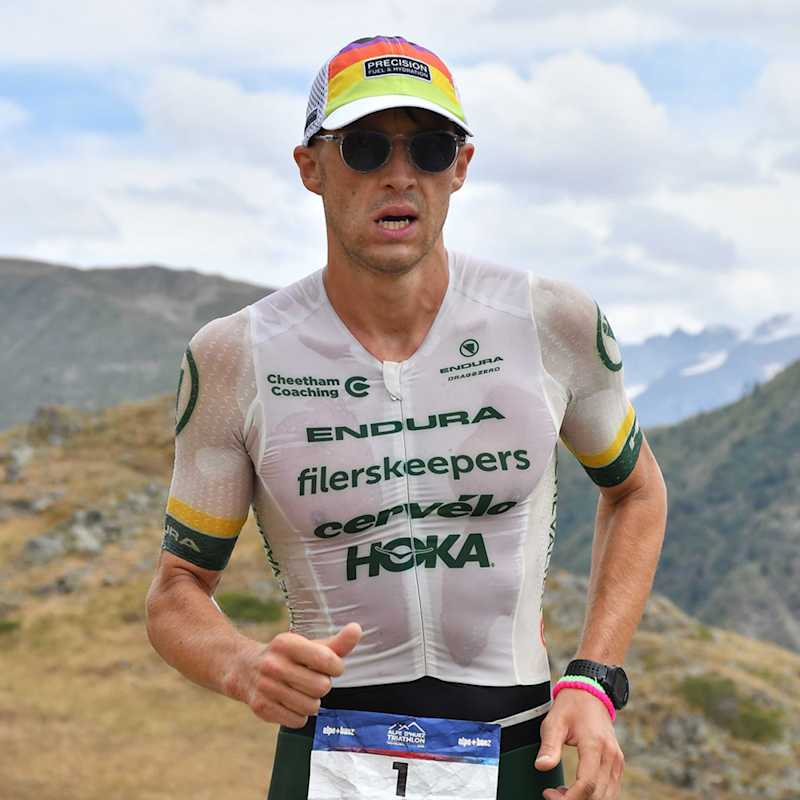
Leon Chevalier
IRONMAN® World Championships
Leon's headline numbers
Leon's strategy
Fueling
Carbohydrate is the main fuel you burn when racing. Failing to fuel properly is a leading cause of underperformance in longer races.
Leon’s Flow Bottle with 150g of carb and 1,500mg of sodium was ejected from his bottle cage after just 15 minutes of the bike after hitting a speed bump. Knowing how much was in there, Leon was able to replace the carb with on-course gels, and still averaged an impressive ~127g/h. Leon was most pleased with his run, clocking his fastest ever time (2:39), and averaging his highest ever carb intake (~128g/h). This is testament to his extensive gut training to tolerate this high amount of carb.
Hydration
Taking on board an appropriate amount of fluid and sodium is essential to maintaining blood volume and supporting the cardiovascular effort needed to perform on race day.
Whilst the absolute amount of sodium and fluid consumed per hour is important, it’s critical to consider these in relation to each other. This is known as 'relative sodium concentration' and it’s expressed in milligrams per litre (mg/L). How much sodium you’re taking in per litre of fluid is more important than the absolute amount taken in per hour.
Sweat sodium concentration (mg/L) is largely genetically determined and remains relatively stable. Knowing how salty your sweat is enables you to replace a good proportion of your sweat losses, which can range from 200-2,000mg/L.
Given Leon’s losses are High (1,392mg/L), nailing his hydration strategy becomes especially crucial when it’s hot and/or humid.
Learn moreLeon was meticulous at keeping his core temperature and perception of heat under control by pouring water over himself at every opportunity on the bike. He then continued this on the run but upped his efforts by eating ice, putting it under his hat and picking up his pre-made Soft Flasks of water which he’d frozen to provide him with cold water at all times. This was a great example of an athlete doing everything he could to manage the conditions, and prevent overheating as temperatures soared along the Promenade Des Anglais. Leon’s sodium intake was lower than he’d planned, likely due to dropping a high concentration bottle, and him forgetting to take his Electrolyte Capsules during the run. In future, especially when temperatures are even hotter (like in Kona for future World Champs), we’d recommend Leon sticks to his pre-race plan and ensures he doesn’t experience any negative side effects of sodium depletion.
Caffeine
Beyond the Three Levers of Performance (carb, sodium and fluid), caffeine is one of only a few substances that is proven to improve performance for most endurance athletes as it can help stave off mental and physical fatigue.
Leon has a high tolerance for caffeine, and in previous races has hit slightly more than the scientific recommendations. Similar to his race at IRONMAN Mallorca, where he dropped some of his nutrition, he replaced this with some caffeinated gels on-course, and ended up taking ~14mg/kg across the entire race. In future, we’d recommend reducing this slightly in line with his pre-race plan, to prevent any adverse effects of over-doing the caffeine that could come about.
How Leon hit his numbers
Here's everything that Leon ate and drank on the day...
Leon's weapons of choice
Final thoughts
Leon's full stats
Data Confidence?
There is an adequate level of accuracy in the data collected and the numbers reported. The athlete manages to recall what they ate and drank including most specifics (brands flavours quantities plausible estimations of volumes). However there are estimations made within the data which affect the overall confidence level in the data reported.